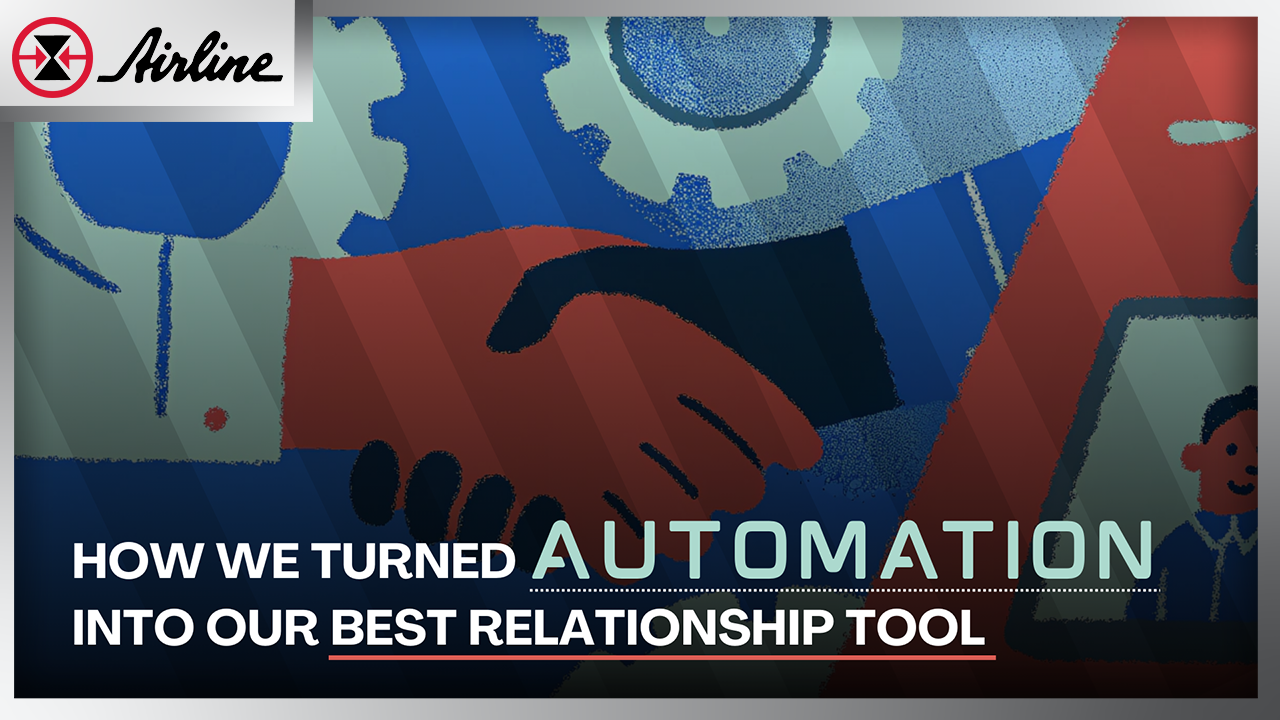“Automation” gets thrown around a lot. For most, it’s shorthand for efficiency: do more with less, cut costs, eliminate bottlenecks.
But the smartest companies see something bigger. Automation isn’t just about saving money; it’s about building stronger, more trusting relationships with customers, suppliers, and employees.
But why does that matter? Because outdated manual processes quietly erode trust every day:
- Customers wait 24-48 hours for answers that should be instant.
- Small suppliers are shut out because their data is “too hard to process.”
- Employees often burn out on repetitive work instead of solving real problems.
These look like operational inefficiencies on the surface. But underneath, they’re relationship problems. And that’s exactly where automation, done right, makes the difference.
In this article, we’ll share how Airline isn’t just cutting costs with automation; we’re building stronger, more human businesses by making availability more real-time, reducing friction, and ultimately delivering a better customer and partner experience through our investment in solutions like Clover. Let’s get into it.
Skip to a Section:
A Real-World Example | The Bottom Line | Additional Resources
Want to dive deeper into our company’s data journey?
Listen to Airline Hydraulics’ story on the Behind the Data podcast with CloverDX.
A Real-World Example: Airline Hydraulics
At Airline Hydraulics, a value-add distributor with over 280 suppliers and millions of product SKUs, we saw firsthand why change was needed.
 For years, that scale made even basic updates, like pricing or stock availability, slow and frustrating. A supplier’s catalog update could take up to four days to process, leading to customer frustration with outdated answers, difficulties for smaller vendors to connect, and employees being stuck in repetitive data entry instead of higher-value work.
For years, that scale made even basic updates, like pricing or stock availability, slow and frustrating. A supplier’s catalog update could take up to four days to process, leading to customer frustration with outdated answers, difficulties for smaller vendors to connect, and employees being stuck in repetitive data entry instead of higher-value work.
When we invested in real-time automation with Clover, the shift went far beyond efficiency.
From Bottlenecks to Breakthroughs:
- Processing time dropped from four days to just three hours. Files with a million records that once took days now finish in hours.
- Over 3 million SKUs are updated in real time, with some suppliers now pushing hourly updates.
- 25–30 sub-processes were eliminated, replaced with a single streamlined workflow.
- Now, over 3 million SKUs are updated in real time, and $12 million in stock is always visible, helping customers plan confidently.
- 200+ employees now work with more accurate data every day.
Beyond Efficiency: Building Trust:
But the numbers tell only part of the story. The real transformation was in relationships:
- With fewer delays and errors, customers can now make decisions instantly, whether at 3 AM or 3 PM. They don’t just see what’s in stock; they get accurate lead times to plan their production schedules.
- Suppliers trust us more deeply. They knew their updates weren’t sitting in a backlog but reaching the market in real time.
- Employees grew into new roles. And unlike many automation stories, ours came with ZERO layoffs.
At the time, every former data-entry employee stayed with Airline, moving into roles as managers, purchasers, customer service representatives, and even outside sales. A few of those people came to me, the Director of Technology, and our CEO, early on, with fear and said:
“ I know you're going to automate my job... Could you give me six months so I can start looking for another job?"
Since then, I can honestly say our data entry people are still with us in different roles, and it's been amazing to see what they can do for us when they get to use their minds as opposed to just their fingers on a keyboard.
That shift built more than efficiency. It built trust, not just with customers and suppliers, but inside our own company. Employees now proactively bring automation ideas to leadership, fueling grassroots innovation from the bottom up.
The Bottom Line: Building Relationships, Not Just Systems
Automation done right isn’t just about doing things faster or cheaper; it’s about doing them better for everyone involved. At Airline Hydraulics, the payoff wasn’t just efficiency metrics. It was stronger partnerships with suppliers, deeper trust from customers, and new opportunities for employees.
But not every automation journey delivers those results. Companies that treat automation only as a cost-cutting exercise often make two mistakes:
- Automating in isolation. Rolling out tools without considering how they connect to the customer or supplier experience.
- Overlooking people. Saving time on tasks but failing to invest that time back into employee growth and relationship-building.
The smartest companies take a different path. They start with processes that directly affect relationships, like pricing, availability, and response times, and they design automation to make those touchpoints more reliable and human.
Looking ahead, automation will only become more central to how businesses operate. The companies that win won’t be the ones with the leanest cost structures, but the ones that earn the most trust.
Because in an era of uncertainty, trust is the ultimate competitive advantage.
You Think Automation is Just About Cost-Cutting? |
|
|
Connect with Our Experts
Want to discuss your automation strategy?
Connect with Todd Schnirel, Airline's Director of Technology, to explore how relationship-focused automation could work for your business and partnerships.
Schedule a conversation with Todd
Or, have general questions? Contact our customer service team today!
Additional Resources:
- Airline Website
- Brands + Partners
- Article: Humans at the Heart of Automation: Why Emotional Intelligence Shouldn't be Overlooked in Industry 4.0
- Article: Automation Isn't the Biggest Threat to US Factory Jobs











Leave Comment